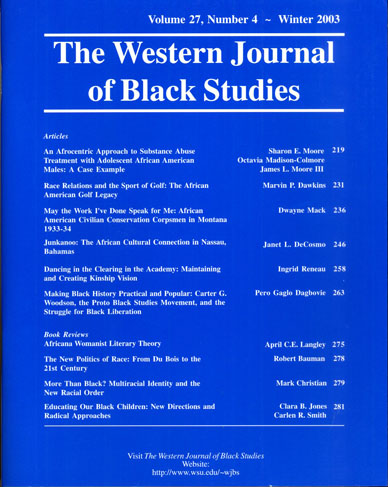Volume 27, Issue 4
An Afrocentric Approach to Substance Abuse Treatment
with Adolescent African American Males: Two Case Examples
Sharon E. Moore, Octavia Madison, James L. Moore
A response to the use of drugs among adolescents has been the development of drug treatment programs. Most of these programs operate from a traditional European approach to treatment, which may not be as effective in meeting the needs of the African American adolescent male. There is scant literature that addresses therapeutic interventions that have been specifically designed to meet the needs of this population. In this article, using two case examples, the authors discuss the use of an Afrocentric approach as a consideration for substance abuse treatment with African American adolescent males.
pp. 219-230
Race Relations and the sport of Golf:
The African American Golf Legacy
Marvin P. Dawkins
Recent interest in the role of African Americans in the game of golf has coincided with the meteoric rise of Tiger Woods to the top of that sport. However, African Americans have a long history of participation in golf characterized by exclusion from mainstream golf activities controlled by whites and the development of their own activities, organizations and star performers in response to racial discrimination. This paper examines the history of race relations in golf and argues for the formal recognition of the "African American golf legacy" by the golf establishment as a part of current efforts to foster greater inclusion of African Americans and other minorities.
pp. 231-235
May the Work I've Done Speak for Me:
African American Civilian Corps Enrollees in Montana, 1933–1934
Dwayne Mack
During the summers of 1933 and 1934, African-American Civilian Conservation Corps (CCC) enrollees contributed their labor to the white communities of Libby and Troy, Montana. Within two years, they transformed the area's infrastructure, by fighting fires, digging firebreaks, planting trees, restoring parks and recreational areas, stringing telephone and electrical wires, laying roads, truck trails and an airport runway, and erecting lookout towers.
pp. 236-245
Junkanoo: The African Cultural Connection in Nassau, Bahamas
Janet L. Decosmo
This article delineates the main stages in the little known history of Bahamian Junkanoo as a cultural expression relevant to the survival of African traditions in the western hemisphere. It seeks to answer the following questions: Historically, what has
Junkanoo meant for Bahamians since its origins in the 18th and 19" centuries? What are the socio-political and roots of what is now a secular observance? Is Junkanoo a celebration of freedom (emancipation), an African religious ritual, an
opportunity for marginal groups to unify and express themselves in public spaces, or a nationalistic display of identity? In doing so, it demonstrates the commonalities among diverse African diasporic cultures in the Caribbean, as well as their relationship to similar cultural expressions in North America (Florida and the Carolinas) and South America (Brazil).
pp. 246-257
Dancing the Clearing in Academia Struggle:
Maintaining and Creating Kinship Vision
Ingrid Reneau
In response to scholar/poet and public art artist, Estella Conwill Majozo 's call to "search for the good and to make it matter," 1 explore what I call a "Ringshout Aesthetic" approach to creating intellectual life in academia. Essentially,
approach combines such theoretical frameworks as the 'clearing 'from Toni Morrison's Beloved, the concept of "vocal utterance" from Ayi Kwei Armah 's mythic and prophetic novel Two Thousand Seasons and the choreography of thee African derived cultural/religious ritual, the Ringshout, to formulate an intellectual/spiritual aesthetic that affords an enabaling
and liberating, African Diasporic vision for the ways in which we can conceptualize and do intellectual work in the twenly-first century academy and beyond.
pp. 258-262
Making Black History Practical and Popular:
Carter G. Woodson, the Proto Black Studies Movement and
the Struggle for Black Liberation
Pero Gaglo Dagbovie
Carter G. Woodson (1875-1950) wholeheartedly devoted himself to the early black history movement, an essential component of the proto (pre-Black Power era) Black Studies Movement. Woodson foreshadowed modern Black Studies scholars in stressing that the study of African descendants be scholarly sound, creative, restorative, and, most importantly, directly relevant to the black community. He popularized black history with a variety of innovative strategies and vehicles, including Association for the Study of Negro Life outreach activities, Negro History Week, and a popular black history magazine. This article explores how
the multi-talented Woodson democratized, legitimized, and popularized black history. Special attention is paid to the nature of Woodson's messages to various audiences and sectors within black communities. Dimensions of Woodson 's dynamic approach can be adapted to Black Studies paradigms and strategies of the twenty-first century.
pp. 263-274
Book Reviews
Africana Womanist Literary Theory
Author: Clenora Hudson-Weems
Reviewed By: April C. E. Langley
The New Politics of Race: From Du Bois to the 21st Century
Editor: Marlese Durr
Reviewed By: Robert Bauman
More than Black? Multiracial Identity and the New Racial Order
Author: G. Reginald Daniel
Reviewed By: Mark Christian
Educating Our Black Children: New Directions and Radical Approaches
Editior: Richard Majors
Reviewed By: Clara B. Jones and Carlene R. Smith

| The WJBS site is normally maintained by Tanya Gonzales. Please feel free to e-mail comments, queries, and suggestions. |
Heading using the h3 tag
Lorem ipsum dolor sit amet, consectetur adipisicing elit, sed do eiusmod tempor incididunt ut labore et dolore magna aliqua. Ut enim ad minim veniam, quis nostrud exercitation ullamco laboris nisi ut aliquip ex ea commodo consequat. Duis aute irure dolor in reprehenderit in voluptate velit esse cillum dolore eu fugiat nulla pariatur. Excepteur sint occaecat cupidatat non proident, sunt in culpa qui officia deserunt mollit anim id est laborum.